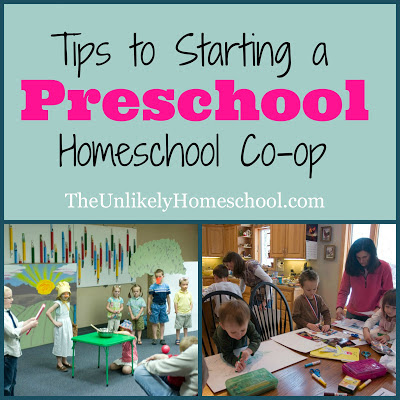Today I'd like to share a few thoughts that will hopefully help you select just the right venue and timetable for your group.
 |
| Potato sack race and picnic |
Let's start with the place...
There are really only two basic options for a PLACE...a home or a public meeting area.Member's Home
While meeting at a member's home may at first seem less than ideal, depending upon the size of your co-op, it might be the very best location for a preschool group. Remember also that no ONE member has to bear the entire load by hosting the meetings every time. The co-op group could rotate homes each week, month, or semester. A simple spreadsheet could easily organize the rotation. Before making a final decision on whether to meet in a personal residence, consider the following...- A home offers age-appropriate toys and equipment for little ones and is often a more conducive meeting place for those who have babies or toddlers in addition to preschoolers.
- Less packing and hauling will be required for meeting in a home as the hosting family can provide the basic necessities such as snack provisions, miscellaneous school supplies, and first aid essentials.
- A home is definitely a more nurturing environment for preschoolers who may or may not be used to the restrictions/formalities or a public meeting area.
- Meeting in a home often requires the hosting family to do much set-up and clean-up.
- A large gathering of children in one home can often lead to broken or ruined personal property.
- As preschoolers grow bigger physically or as the group expands to welcome new families or new babies, homes can quickly become overcrowded.
- Many homes do not have an adequate number of chairs or workspaces to accommodate a large group. Most dining room tables only seat 8 or less.
A Public Meeting Area
When deciding to meet in a public, more formal location, you must consider your budget. While most publicly funded buildings such as libraries, police stations, and town halls have free meeting rooms that may be used on a regularly scheduled basis, these rooms are rarely ever advertised to the general public. You will have to make a few phone calls to determine if one is available. In addition, some churches open their doors to private groups during the weekdays, but they often limit FREE use to church members only.If you are unable to secure a FREE meeting area, consider renting a space. Sometimes larger churches or hotel/conference centers will rent out a meeting room for a small fee. This charge can be divided among the co-op families making rental space quite affordable.
Here are a few thoughts to consider before you settle for a public meeting area...
- Unless you are meeting at a church that has suitable kid's classrooms and nursery facilities, public meeting areas are not always kid-friendly.
- You will have to haul and store all of your frequently used snack, school, and project supplies.
- Public facilities meet in PUBLIC. Will you be comfortable having an occasional library patron interrupt your co-op class to ask you if you know where the bathroom is? (Trust me...it happens!)
- Meeting in a public meeting facility often develops a more formal feel to the group. Members tend to take their commitment to co-op meetings more seriously when a fee is charged.
- If you are utilizing a free public meeting room, you are often at the mercy of the facility's schedule. Most FREE spaces have a waiting list and/or a busy sign-up sheet that you will have to consider.
- If a teacher is sick and the meeting needs to be rescheduled, it can be difficult to arrange a PLAN B day.
- Sometimes a janitorial fee is charged for the set-up/clean-up of a public space.
 |
| Drawing "flat selves" for a Flat Stanley project |
Once the newly established co-op members have agreed upon a meeting place, you then need to establish a suitable timetable for your year.
And now for the time...
A quick survey of the group can help narrow down a tentative schedule.
Will you meet all year long or just during the traditional school calendar?
What will be your start/end dates?
Do you wish to meet once a month? bi-weekly? weekly?
Will you meet all day? Just in the morning? Just in the afternoon?
Will you meet over lunch hour?
- How often is the facility even available?
- Does it have the necessary equipment to accommodate for baby/toddler naps?
- Does it have a kitchen and dining area to accommodate for a lunch break?
- Does it have adequate large-motor space for the breaks/physical activity that preschoolers will need if the meeting is extended for more than an hour or so?
In addition to the meeting location, your reasons for establishing a co-op and/or your class offerings will also need to be considered before you solidify your timetable.
Most co-ops are established to provide a social outlet for homeschooled kids and can be more infrequent. However, if you are hoping to utilize a co-op for rigorous academic instruction or to supplement the CORE material you are teaching at home, you might want to consider meeting more frequently in order to provide ample teaching time and review.
Most co-ops are established to provide a social outlet for homeschooled kids and can be more infrequent. However, if you are hoping to utilize a co-op for rigorous academic instruction or to supplement the CORE material you are teaching at home, you might want to consider meeting more frequently in order to provide ample teaching time and review.
For more info on Starting co-ops:
IntroductionPartnering With Other Families
Choosing a Time and a Place to Meet
Planning Age-Appropriate Classes
Creating a Schedule and Assigning Jobs


No comments:
Post a Comment